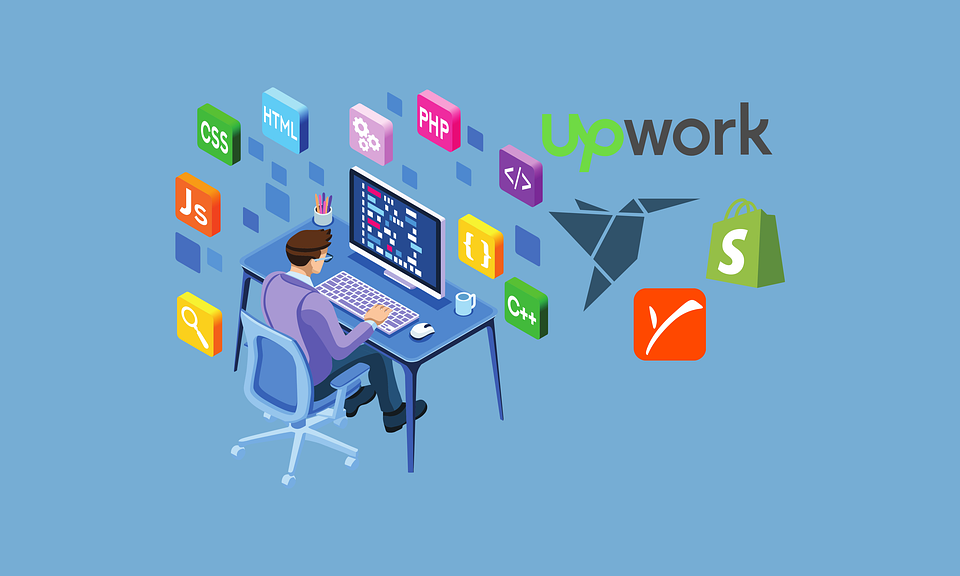
What IS Freelancing?
Freelancing is a great way to gain independence and control over your career. It allows you to work on your own terms, choose clients and set your own rates.
Here’s will discuss some Keywords of Freelancing.
- What is Freelancing and How Does it Work?
- Is Freelancing Easy?
- How to Start Freelancing with No Experience?
What is Freelancing and How Does it Work?
Freelancing refers to a type of self-employment where individuals offer their skills and services to clients on a project-by-project basis rather than being employed by a single company. Freelancers work independently and have the flexibility to choose their clients, projects and work hours. This model allows them to work in various industries such as writing, graphic design, web development, marketing, and more.
How Does Freelancing Work?
Finding Clients: Freelancers find clients either through direct networking, referrals, or online freelance marketplaces. Some freelancers market their services directly to potential clients, while others rely on inbound inquiries from their online profiles or personal websites.
Agreements and Contracts: Before starting a project, freelancers often sign contracts or agreements with clients that outline the project’s scope, deadlines, payment terms, and other terms. This helps protect both parties and ensures clarity.
Work and Delivery: Once a project begins, freelancers complete the work as per the client’s specifications. Communication is key during this phase, as freelancers must ensure they meet the client’s expectations.
Build Reputation: Building a good reputation is crucial to freelancing success. Delivering high-quality work on time leads to positive reviews, repeat business and referrals, helping freelancers grow their business over time.
Benefits of Freelancing:
Flexibility: Freelancers take control of their work and can choose the projects they want to work on.
Independence: Freelancers do their own work and are not tied to anyone today.
Growth Prospects: Lancers can scale themselves by growing their client base by increasing rates.
Challenges of Freelancing:
Income Instability: Freelancers may experience periods of no work, leading to irregular income.
Self-Management: Freelancers are responsible for managing their own workload, finances and taxes.
Client Acquisition: Finding clients consistently can be difficult, especially for new freelancers.
Is Freelancing Easy?
Freelancing offers the allure of flexibility, freedom, and the ability to work from anywhere, but it’s not without its challenges. While some may assume that freelancing is easy because it doesn’t require following a traditional 9-to-5 work structure, the reality is more complex. Whether freelancing is “easy” depends on factors such as skill level, industry, client management, and individual adaptability.
Here’s a detailed look into whether freelancing is easy, covering various aspects of the freelance experience:
Skill and Expertise Level:
Entry-Level Freelancers: Freelancing can be difficult for beginners as they may lack experience or a portfolio to showcase their skills. It often takes time and effort to build a reputation and land the first few clients.
Experienced Freelancers: For those with established skills, freelancing can become easier over time. Experienced freelancers with a strong portfolio, client base, and positive reviews can find it easy to attract high-paying clients and maintain a steady flow of work.
Finding Clients:
Early Struggles: One of the hardest parts of freelancing is finding clients, especially in the beginning. Freelancers need to constantly market themselves and network to get work. It can take weeks or months to secure regular clients, creating income volatility.
Freelance Platforms: Although platforms like Upwork, Fiverr, and Freelancer.com provide access to clients, the competition is often fierce. Beginners may find it difficult to stand out among experienced freelancers and get selected for projects.
Long-term clients: Once freelancers build a reputation, it becomes easier to find repeat clients or secure long-term contracts. However, this requires delivering high quality work and maintaining strong relationships with clients.
Self-Discipline and Motivation:
Self-Management: Freelancers must be disciplined and self-motivated to meet deadlines, manage time effectively, and stay organized. Without a boss overseeing day-to-day work, delays or poor time management can lead to missed deadlines or dissatisfied clients.
Client Management and Communication:
Managing expectations: Freelancers should communicate clearly with clients about project scope, deadlines and deliverables. Misunderstandings can lead to revisions, scope reductions (when clients demand more work without additional pay), or dissatisfaction.
Dealing with difficult clients: Not all clients are easy to work with. Some may require unrealistic expectations, tight budgets, or multiple modifications. Knowing how to handle difficult clients diplomatically is an important skill for any freelancer.
Adaptability and Learning Curve:
Constant learning: Freelancers need to constantly update their skills to stay competitive in their industry. This may mean learning new software, adapting to new trends, or expanding related services.
How to Start Freelancing with No Experience?
Starting freelancing with no prior experience can seem daunting, but it is possible with the right approach. Freelancing is open to anyone with the skills and desire to learn, adapt and grow. While having experience can make it easier to land clients, there are many ways to build a successful freelance career from scratch.
Here is a detailed guide on how to start freelancing with no experience:
Identify Your Skills and Interests:
Even if you don’t have professional experience, you likely have skills that can be turned into freelance services. Start by identifying what you’re good at — whether it’s writing, graphic design, programming, video editing, social media management, or another field.
Learn and Improve Your Skills:
Online Courses: Invest in your skills by taking online courses. Platforms like Udemy, Coursera, Skill share, or LinkedIn Learning offer affordable courses on a variety of topics. Choose courses that suit the freelance services you want to offer.
Practice: Practice is the key to mastering any skill. Start working on small personal projects, volunteer your services to friends or local businesses, or create mock projects to build confidence and capacity.
Use Freelancing Platforms:
Join Freelance Websites: Freelancing platforms like Upwork, Fiverr, Freelancer.com, and People Per Hour are great places to start, even without experience. Many clients on these platforms are open to working with new freelancers, especially if your rates are competitive.
Enhance your profile: Enhance your profile by highlighting your skills, enthusiasm and readiness to deliver quality work. Even if you don’t have prior work experience, emphasize your willingness to go the extra mile for clients.
Focus on Client Satisfaction:
Deliver quality work: Even if you are new, always try to deliver high quality work on time. Going above and beyond with your first few clients can result in positive reviews and referrals, which are invaluable when starting out with no experience.
Communicate effectively: Clear and professional communication is key to maintaining good relationships with clients. Make sure you understand their needs and keep them updated throughout the project.
Develop a Growth Mindset:
Be open to learning: Freelancing is a continuous learning process. The more you learn, the more valuable you become to customers. Be curious and open to feedback.
Set goals: Set both short-term and long-term goals for your freelance career. Whether it’s building a portfolio, landing your first client, or increasing your income, setting clear goals will keep you motivated.
Conclusion:
Freelancing has emerged as a popular and viable career option, with flexibility, autonomy, and the ability to choose the projects you work on. It gives individuals the freedom to set their own schedules, work remotely, and control their professional lives. However, freelancing also comes with challenges such as income instability, self-discipline, and the need to constantly find clients.
Starting freelancing, especially without experience, requires patience, effort and dedication. By focusing on building skills, building a portfolio, networking, and delivering quality work, aspiring freelancers can overcome these barriers and establish themselves in the market. Freelancers must also constantly learn, adapt, and evolve with the changing demands of the industry.
In conclusion, freelancing can be a rewarding and fulfilling career path for those who are determined and willing to navigate its challenges. With the right mindset, persistence, and proactive approach, freelancing offers opportunities for personal growth, financial success, and professional independence.







